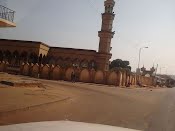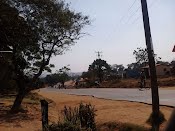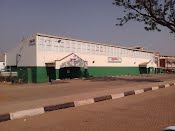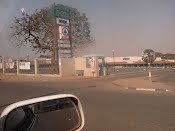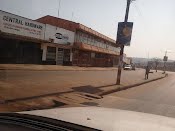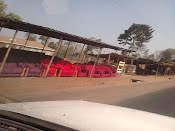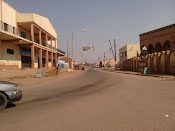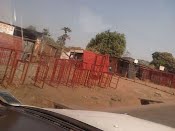Green beans and flowers from Kenya, who benefits from Africa’s agricultural exports? A look at rural agriculture in Africa.
Last night I went to a debate in a committee room deep in the Houses of Parliament hosted by the Royal African Society jointly with the London International Development Centre. Richard Dowden, director of the RAS, moderated discussions with a panel including Christie Peacock (former CEO of FARM-Africa, now chair of Sidai Africa Ltd), Mark Thomas (Director of Food Retail Industry Challenge Fund DFID and manager of rural development at Nathan Associates) and Karima Ola (managing director of the African Development Corporation).
The debate focused on some issues that I see as key in Africa’s sustainable development. The big question was framed as ‘who benefits from Kenya’s exports of green beans and flowers to the UK?’ which throws up some interesting ideas about Africa’s export industry. Lots of people have argued that Africa needs to stop focusing on exports, and strengthen its own internal, domestic situation before looking to trade with the world market. Without wanting to identify too strongly with neoliberal ideas of times gone by, I think that the strengthening of exports and trade between Africa and the world can ONLY be a good thing – it can and does lead to growth. Countries like Zambia are pretty switched on at the moment and getting their balance right. Likewise, Ghana is arguably doing very well also. It’s hard to comment on all the successes though given my limited knowledge of every African country’s agricultural industry….
So, we’re looking at agricultural exports from Sub Saharan Africa to other countries (note that this can mean exports within the continent – something that should be very strongly encouraged in light of current Horn of Africa crisis), the potential problems with standards such as fairtrade, and the positive potential that there is for African agriculture.
The facts (with some help from the RAS)
Africa’s main agriculture export products are well known; tea, cotton, tobacco, cocoa and flowers. Cotton production in the region has multiplied by five since the early 1970s; about 95% of the regions cotton is exported. Kenyan horticulture exports have grown at over 6% a year for the past 30 years reaching 13.6% of export revenues in 2003.
However, mono cropping is potentially dangerous for economies and makes Africa vulnerable. 8 countries in Africa incurred 65% of the $300 million loss in potential revenue in all of sub-Saharan Africa in 2001 due to the poor cotton prices. Diversification is recognised by many leading agronomists as the key to a successful agricultural industry, particularly in Africa where instability of weather, prices and technology put crops at higher risk of failing than in European agriculture where these factors are slightly more stable/manageable. This is significant for both large scale commercial farms as well as the smallholder farmers that make up the back bone of African agriculture. SIMPLY PUT, if farmer X is growing only maize on his 0.25ha plot, and there is poor rain fall, he will get a very low yield on his crop or it will fail altogether. However, if farmer X was growing a combination of maize along with a sturdier crop such as chillies, then at the end of the growing season he would not be quite as bad off.
African agricultural production is struggling, and a key question that I am interested on getting answers to is how do we increase productivity in African agriculture? It’s well known that most farmers in Africa farm for subsistence and on very small plots (between .25 and 3ha). Africa produces less food per capita now than in 1960 (interesting correlation here with the rise of development and aid flows to the region?) About 16% of Africa’s soils are classed as ‘low nutrient’ compared with Asia’s 4% (poor soil quality is a common but not impassable problem), yields generally are lower than the rest of the world and similarly fertilizer input is substantially lower but hectare than the global standard. (9kg in Africa vs 100kg in Asia and 206kg in industrialised countries).
But the story isn’t entirely negative! Agriculture in Africa is buzzing with potential at the moment, and it’s important to bring this to the fore in the debate on aid and development (which I find immensely frustrating in its continuous bashing and bitching and lack of constructive suggestions of how to improve things). Of the fastest growing agricultural economies 17 are in sub Saharan Africa (thanks in large part to exports of cash crops like tea, coffee, cashews etc). 60% of the arable land available in the world is in Africa. Long gone are the days of stereotypes of Africa consisting of cracked earth in Ethiopia, Africa is a rich and diverse place with some amazing land that is more fertile than you could imagine. Anecdotally, I remember the most delicious and biggest carrots I have ever eaten, coming from Molo in South Eastern Kenya, where the soil is rich in nutrients and the idea of ‘organic’ is laughable when both the quality and quantity of produce is so exceptional!
SO what of this debate, on exports in agriculture? I see them as being vital for several reasons:
1. Exports such as green beans typically come from larger commercial farms which have the ability to provide better job security to farmers than subsistence farming, and they also have the ability to connect growers to markets (big issue which I’m very interested in having worked for a commercial farm in Malawi doing precisely that). In that sense, the money we spend on green beans in Kenya is doing more for ‘development’ in Kenya than donating to some WFP sponsored agricultural programme, because it is directly supporting agricultural industry in Africa.
2. Markets like China are increasingly feeling the pressure to find new sources of food to import (given the poor quantity of arable land in China and the growing population, China is having to look overseas for its food). Brazil and other countries in the America’s are not always going to be able to provide the quantity and quality of food, and this is one big part of why China has invested so heavily in Africa. So from the perspective of the Chinese, African agricultural exports are definitely a good thing.
Problems with fairtrade
Christie Peacock brought up an increasingly controversial problem; that farmers are increasingly dissatisfied with ‘Fairtrade’ and its standards. One tea factory in Kenya, we were told, was refused fairtrade status since its drinking water tap was not correctly labelled as drinking water despite all workers knowing that that was its purpose. I have been aware of this for some time, and was surprised that so many people were shocked to hear this. Fairtrade is not the be-all-and-end-all, in addition to the difficult and rigorous standards that they set, there is also the problem with Fairtrade’s main ethos – how much of the extra cost is being passed down the supply chain to the farmer? Isnt this the whole point of fairtrade, I can remember being told about the break up of profits in a regular banana vs a fairtrade one back in Fairtrade’s heyday, but now retailers are increasingly absorbing more of the increased charge on fairtrade goods, whilst the farmer is advertised as receiving a better price for his crop. Fairtrade is a great principle, but these problems question how accountable fairtrade is and if there standards are perhaps too rigorous and unflexible.
Duncan Green says “Ethiopian women sorting through the coffee beans will have to work for 8 years to earn what I get from Oxfam in one day”. Interesting point, but what about like for like costs? Producing a pound of cotton in Burkino Faso costs 21 cents compared to 73 cents in the US itself. The value of the fairtrade market in the UK reached £493 millioin in 2007, a staggering sum of money.
Of course there is also the issue of subsidies, and though I don’t want to spend too long writing about it here, it is a question that comes up time and time again; why do we in the West expect Africa’s agricultural markets to be liberalised and unprotected, when we have such strong systems of subsidies in place in the EU and the US? One counter argument offered by Mark Thomas last night was that we give our politicians a mandate to decide to implement subsidies in our country, and that it’s up to African governments to do the same.
Let’s also think about the distortions in infrastructure that are geared more to the export market in African agriculture (e.g. great asphalt connecting unilever tea farm to markets vs the bumpy mud and rock road linking smallholders to their trading centre), perhaps this can be utilised and highlighted as being a great tool for development. The Chinese again have invested (rightly or wrongly) a lot into developing Africa’s infrastructure and filled a vacuum left by Western donors who became more interested in softer development issues in the last 20 years).
What next?
I would like to see the redevelopment of Government Marketing Boards in African agriculture; they were mostly done away with after independence which is a shame since they provided great opportunity and potential. Extension services and marketing boards are key in the successful development of an agricultural industry.
I would also like to see a stronger promotion of ‘zero tillage’ to smallholder farmers, that they need not work so hard on getting the land perfect in order to gain a good yield. It is integral to the future success of agriculture in Africa to transfer knowledge on zero tillage to the many smallholder farmers throughout sub Saharan Africa – this is a particular role that commercial farms can fulfil in providing systems that better the value chain..
Again, anecdotally, I can draw on my experience working for a commercial farm in Malawi. The company promoted crop diversification; they grow chillies as well as maize, soya, groundnuts and some livestock like poultry and lambs. The company exports chillies internationally as well as supporting domestic consumption by stocking local supermarket s with vegetables and poultry. It is not a huge operation, but is indicative of many small commercial farming operations throughout southern and eastern Africa – the potential is there and tremendous results can be achieved using these commercial farms to connect growers to markets. The company I was working with worked extensively on training smallholder farmers and connecting an ever growing community of outgrowers (we would provide the training and extension services to farmers and also provide the secure market to buy their crop and sell it at a good price, this served the business interests’ as there wasn’t the capacity to grow everything ourselves). Commercial farms can also support subsistence agriculture in Africa by working to provide better storage solutions (wasted and spoiled crops is a big problem in many communities). Some donors like USAID and DFID have been working with commercial farms on storage solutions and developing ‘credit’ or ‘voucher’ style schemes.
Coming back to the idea of exports to countries within Africa, I’m very interested in this area and the idea of bringing manufacturing and processing into Africa rather than the model that has existed thus far of shipping primary commodities from Africa to the East/West to be processed and then shipped somewhere else. Plumpynut is the biggest example, the peanut paste RUTF that is used in treating clinical malnutrition – the peanuts are largely grown in Africa and exported to France where they are manufactured into the paste, then shipped back to Africa to support the WFP and UN’s malnutrition programmes…. Why not cut down costs and boost a local economy by exporting the peanuts within Africa and setting up a processing plant? (Check out AfriNut and Valid Nutrition, as I left Malawi this argument of mine was/is being put into practice).
These issues aren’t without problems though, and certainly the company I worked for enjoyed its fair share of difficulties. Smaller commercial farms are the world over known as having to work very hard compared to the money they make, this is no different in Africa and the difficulty to turn over a decent profit potentially impacts the level of assistance commercial farms can provide to smallholder farmers. This is where donors need to step in and bridge the gap between what we all say that commercial farms can do and what they are actually doing on the ground. Don’t underestimate the difficulties of working in an environment that is not stable – the fuel crisis in Malawi for example has crippled many businesses and limits your ability to export…this in turn puts off importers abroad as they want to be buying produce from a more stable source and quite often they will look to the East. I’m not sure what the solution here is short of suggesting improved political stability in Africa (hmmmm!)
So basically, with better investment and renewed interest in strengthening extension services and marketing boards, African agricultural exports could go up and benefit everybody – the farmers as well as the consumers, at the same time boosting productivity in Africa and potentially helping economic growth on a sustainable and longer term trajectory than previous methods employed…
In the broader argument of connecting farmers to markets, the debate concluded by arguing that buying beans from Kenya et al is a good thing.
If you are interested in this topic I strongly recommend you get a book by a chap called Stephen Carr, ‘surprised by laughter’, I met him several times in Malawi and he is incredibly clued up on agriculture in Africa after a long spanning career working throughout the continent…
I’m quite sure I’ve missed out a lot here, but hopefully these musings are in some way indicative of the need to put agriculture firmly back on the agenda for development (properly, not just rhetorically) and the relevance of African agricultural exports in a broader global debate on climate change and food sourcing (much criticism in the UK recently on the fuel used to get beans from Kenya to UK etc although it has been proven that more fuel is used to grow roses in Dutch green houses and freight them to UK than for the flowers to be grown naturally in Kenya and flown over… so.. there!)








